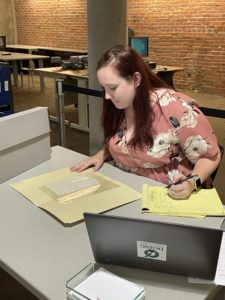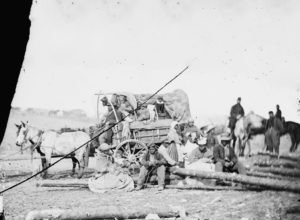calsfoundation@cals.org
The CALS David Stricklin Research Fellowship Experience: Kimberly Green, 2022
During this sizzling summer, we’ve all spent what little energy we have looking for bright spots not caused by the relentless sunshine. In July, one such welcome event was the arrival of the first Stricklin Research Fellow. The fellowship was established in honor of former CALS Butler Center for Arkansas Studies director David Stricklin to assist students, teachers, and other researchers in using materials held by the Butler Center. Learn more about it here.
The first fellow is Kimberly Green, who is pursuing a master’s degree in history at Arkansas Tech University in Russellville. Green was able to use the funding to travel to Little Rock and spend three days here using our collections. We all enjoyed meeting her, and Roberts Library staff members were pleased to help her identify materials relevant to her thesis topic. I’m happy to let her use this forum to discuss her time doing research with us.
—Glenn Whaley, manager of the CALS Bobby L. Roberts Library of Arkansas History & Art
***

It all began with an email from my advisor at Arkansas Tech University, Kelly Jones, presenting an opportunity to explore archives at the CALS Butler Center for Arkansas Studies that could be beneficial to my master’s thesis, which focuses on Arkansas’s Civil War contraband camps and the daily struggles and experiences of African Americans at that time. I sent in my application, and a few weeks later I received an email that I was chosen as the first recipient of the CALS David Stricklin Research Fellowship. Wow! It was now time to sit down and figure out when I would dive into this research.
Prior to beginning my research, Brian Robertson, manager of the Research Services Division at the CALS Roberts Library, took me on a tour of the building and explained how it was made up of architecture from three centuries: 1800s, 1900s, and 2000s. In addition to research materials and office space, the building also hosts rotating art exhibitions from Arkansas artists and has a bookstore and retail art gallery.

On my first day in the Roberts Library Research Room, I began searching through documents for any sort of discussion or mention of African American “contraband” fugitives (meaning escaped or Union-freed slaves; read more about contraband camps in the CALS Encyclopedia of Arkansas here) or anything mentioning their situation inside Union lines. Many of the documents in the archives focused on Helena, Little Rock, and Pine Bluff—which were the primary areas of focus I was aiming for in my thesis research. Several of the documents included scattered mentions and accounts of African Americans’ experiences written in letters back home to family members or friends. As my first day was concluding, I browsed the finding aids of some more collections to have pulled for the next day, and then began organizing and sorting the documents I had collected that seemed fruitful.
Days two and three were much the same: lots of collections to search (while also constantly adding more!) for any mentions of African Americans by soldiers in letters to families. Many mentioned their experiences on picket duty or drill, some mentioned the monotonous life of a soldier, others mentioned their desire for goods such as butter and cheese, and almost all wrote about missing their families and wanting to return home. In addition to those details, some wrote about what they witnessed of African Americans and contraband camps. After browsing through twenty-six archival collections, along with frequent sorting and organizing of noteworthy documents, this phase of my research was done. While I had hoped to find documents that focused on the African American perspective and their narratives, I did find several documents from soldiers that included conversations with African Americans. The absence of narratives from African Americans provides a challenge (and is telling in itself), but the Butler Center’s archives in the Roberts Library provided me with exceptional documents that will advance my continuing research.

The experience I had at CALS was extremely rewarding, and I was thrilled to have the opportunity to meet the honoree of the fellowship, David Stricklin. I went to lunch with Brian Robertson, Glenn Whaley, Bobby Roberts (former director of CALS), and David Stricklin, and it was a wonderful time filled with endless laughter. David Stricklin and Bobby Roberts asked questions about my research and thesis and provided some tips about where I might find more documents that could aid my research. They also got me in contact with Carl Moneyhon from the University of Arkansas at Little Rock, who could also provide some feedback on my research. David Stricklin is one of the sweetest people that I have met, along with Bobby Roberts, Glenn Whaley, and Brian Robertson. I didn’t know what to expect when I first walked into the building, but I had a wonderful experience. The suggestions I received from everyone were unexpected, but extremely welcomed, and only enriched my time with CALS. I don’t think I could have asked for a better introduction to archival research.
The entire staff at the CALS Roberts Library was welcoming and friendly, and honestly helped calm my nerves as I entered on my first day. I was walking into the unknown, as this was the first research opportunity I’ve ever had at this level. Although I’ve lived in Arkansas my entire life, I had never been to the River Market area in Little Rock and did not really know about this library. CALS offered me the perfect opportunity to begin my archival research not only for my master’s degree, but also for the next step in my educational journey to my PhD. The atmosphere, people, and experience were worth more than I can begin to describe. This opportunity was truly rewarding and a great first step into archival research, showing me new avenues to explore.
—Kimberly Green, inaugural Stricklin Research Fellow




